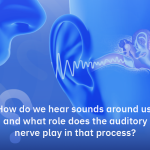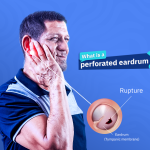Motion Sickness
Many people may experience dizziness or imbalance while riding in a car, on a boat, or during continuous motion. This sensation is known as motion sickness, which can be uncomfortable and may affect concentration or the ability to perform daily activities.
In this article, we will explain what motion sickness is, its causes, symptoms, and the difference between it and general dizziness or imbalance, as well as methods for diagnosis, treatment, and prevention
- What is Motion Sickness?
- What Causes Your Sense of Imbalance?
- Who Is Most Prone to Motion Sickness?
- Signs That Indicate Motion Sickness
- How Long Do the Symptoms Usually Last?
- What Is the Difference Between “Motion Sickness” and “Inner Ear–Related Dizziness”?
- Simple Guidelines to Reduce the Feeling of Dizziness
- How Is Motion Sickness Diagnosed?
- Treatment: Steps to Manage Motion Sickness
- Complications of Not Addressing It Early
- Why Choose Dr. Saleh Saker Al-Amry’s Clinic?
- Frequently Asked Questions
What is Motion Sickness?
Motion Sickness is a disorder that occurs when the signals received by the brain from the eyes, inner ear, and nervous system about the body’s position conflict with each other. This mismatch prevents the brain from accurately determining whether the body is in motion or at rest, leading to dizziness, nausea, or loss of balance.
What Causes Your Sense of Imbalance?
The factors that trigger motion sickness vary from person to person, and the most common ones include:
- Continuous or rapid movement, such as riding in a car, plane, or ship.
- Inner ear sensitivity: Some people have a more sensitive balance system in the inner ear, which sends strong signals to the brain even with minor movements, leading to dizziness or nausea.
- Focusing the eyes on a fixed point within a moving environment, such as reading while traveling.
- Fatigue, stress, or lack of sleep, which reduce the body’s ability to cope with motion.
- Certain hormonal changes or medications that affect the body’s balance signals.
Who Is Most Prone to Motion Sickness?
Some groups are more likely to experience motion sickness than others due to physical characteristics or specific medical history. The main groups include:
- Children and adolescents are more susceptible than adults.
- Women are more prone, with hormonal changes, menstrual cycles, and pregnancy playing a role.
- Individuals with a history of balance disorders or dizziness (such as vestibular disorders or migraines).
- Those who use virtual reality or watch moving content for extended periods.
Signs That Indicate Motion Sickness
Motion sickness manifests through a set of symptoms that a person usually experiences when exposed to motion. These symptoms help distinguish motion sickness from other types of dizziness and facilitate medical diagnosis.
When experiencing motion sickness, a person may feel:
- Dizziness (a sensation that objects around you are spinning or that you are spinning).
- Imbalance (“swaying” of the body).
- Nausea and vomiting.
- Increased saliva production.
- Cold sweating.
- Headache.
- Rapid breathing.
- Fatigue.
How Long Do the Symptoms Usually Last?
The duration of symptoms varies depending on the intensity of exposure and contributing factors. In some cases, symptoms disappear within minutes after the motion stops, while in others they may persist for several hours.
If left unmanaged or accompanied by additional factors, symptoms may become recurrent or somewhat chronic, requiring specialized evaluation.
What Is the Difference Between “Motion Sickness” and “Inner Ear–Related Dizziness”?
The main difference between them lies in the cause of dizziness and the nature of the trigger:
- Motion Sickness: Usually occurs when exposed to continuous motion or viewing moving scenery. It is caused by a conflict between signals from the eyes, inner ear, and brain, leaving the brain confused and resulting in dizziness and nausea.
- Inner Ear–Related Dizziness: One of the most common causes by the movement of tiny crystals within the inner ear canals. This movement leads to sudden, short episodes of dizziness that occur when the head is moved in a certain way, not necessarily with general body movement. Other cause due to change in the volume and content of inner ear’s fluids
Simple Guidelines to Reduce the Feeling of Dizziness
The chances of experiencing motion sickness can be reduced by following some simple precautions before and during motion. These measures help the brain and body adapt better and alleviate symptoms, including:
- Before traveling: Get enough sleep and avoid caffeine or alcohol.
- During motion: Avoid reading books or using phones, and focus your gaze outward.
- On a boat or plane: Choose a seat with minimal movement, such as mid-plane seats over the wings.
- Avoid certain irritants: Such as smoking or strong odors during travel.
How Is Motion Sickness Diagnosed?
Medical History and Symptoms:
- The doctor asks about the nature of the dizziness, its timing, duration, and the positions or movements that trigger it.
- The doctor also inquires about accompanying symptoms such as nausea, sweating, or rapid heartbeat.
Clinical Examination:
- Assessment of body balance and walking posture.
- Observation of eye movements to detect any dysfunction in the inner ear or nervous system.
Additional Tests if Needed:
- Inner ear tests.
- Imaging tests (such as MRI or CT scans) if the doctor suspects other neurological causes.
- Blood tests to rule out metabolic or hormonal issues that may cause similar dizziness.
Treatment: Steps to Manage Motion Sickness
Motion sickness, also known as “travel sickness,” can be alleviated or treated through various methods, either with medications or non-pharmacological techniques. Here are the main treatment approaches:
Avoid Triggers Whenever Possible:
- Sit in a stable position in the vehicle, such as the front seat of a car or the middle of a boat.
- Try to focus your gaze on a fixed point away from motion.
- Avoid reading books or using a phone while in motion.
Medication:
- Antihistamines that help reduce nausea and dizziness.
- Anti-nausea medications if the nausea is severe.
- It is usually recommended to take medication about an hour before travel or as directed by a doctor.
Natural and Home Remedies:
- Ginger: Can be taken as tea or tablets to relieve nausea.
- Drink water regularly to prevent dehydration, which can worsen dizziness.
- Eat light meals before travel and avoid overeating.
Complications of Not Addressing It Early
If left untreated or unmanaged, motion sickness may lead to:
- A persistent feeling of imbalance or fear of movement and travel.
- A noticeable impact on quality of life (avoiding travel, missing work, or limiting activities).
- In rare cases, if there is an underlying vestibular disorder that is not treated, it may develop into a more complex condition.
Why Choose Dr. Saleh Saker Al-Amry’s Clinic?
If you’re frequently experiencing a sense of imbalance or dizziness related to movement, travel, or visual motion, Dr. Saleh Saker Al-Amry’s clinic offers specialized care through:
- Accurate assessment of the causes of dizziness and imbalance.
- Precise diagnosis to determine whether it’s motion sickness, a vestibular disorder, or another condition.
- Comprehensive treatment plans that include behavioral guidance, medications, and balance rehabilitation.
- Professional follow-up to reduce symptoms and improve quality of life.
Frequently Asked Questions:
1. Is motion sickness dangerous?
No, in most cases it is not dangerous. However, it may affect quality of life if it becomes frequent or severe, which is why proper evaluation is important.
2. What is vestibular rehabilitation, and is it necessary for treating motion sickness?
Vestibular rehabilitation is a set of specialized exercises designed to strengthen the vestibular system in the inner ear, which is responsible for balance. Not everyone needs vestibular rehabilitation; it is recommended only for those who experience recurrent dizziness or have weakness in the vestibular system, as it helps improve balance and reduce the body’s sensitivity to movement over time
In conclusion, motion sickness is a common condition that can affect your daily life, but it is both diagnosable and effectively treatable.
If you experience dizziness or a sense of imbalance related to movement or visual motion, it’s best not to ignore it. Consult an ENT (Ear, Nose, and Throat) specialist for a thorough evaluation and a personalized treatment plan.
Simple preventive measures are often sufficient, but in recurring cases, medical intervention becomes necessary.





